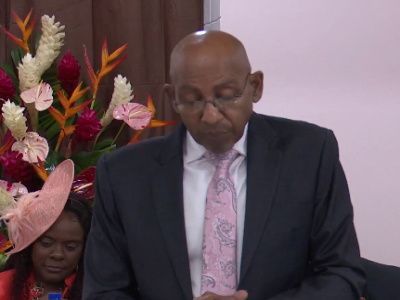
By Staff Writer
ROSEAU, Dominica, Jul 25, CMC – The Dominica government Friday presented an EC$1.33 billion (One EC dollar=US$0.37cents) budget to Parliament, indicating that it will finance the fiscal package through a combination of the government’s revenue, loans, and grants.
Finance Minister Dr. Irving McIntyre told legislators that the recurrent revenue is EC$1.1 billion, with capital revenue set at EC$5.2 million and grants equivalent to 117,7 million, and loans at EC$88.8 million.
He said that the loans have already been approved by Parliament and, together with the grants, are all earmarked for capital projects. He said the other capital project,s along with the recurrent expenditure, will be financed by the EC$1,103.7 million recurrent revenue estimates.
In a near three hour presentation, McIntyre told legislators that the recurrent revenue estimates comprise tax revenues of EC$443.9 million, EC$635.0 million from the Citizenship by Investment (CBI) programme, and other recurrent revenues, such as fees and licences totaling EC$24.8.
He said of the amount of EC$443.9 million in tax revenues, the government anticipates that a total of EC$46 million will be collected in respect of arrears of payments to government for taxes, licenses, lands and hospital fees.
“Let me at this point commend the staff of the Inland Revenue, the police officers and the staff of the Ministry of Housing for their extraordinary efforts with regards to arrears collection during last Fiscal Year.
“Last fiscal year, government collected EC$47.6 million in arrears. Ninety-five percent of this amount was arrears of taxes collected through the efforts of the staff of the Inland Revenue Division—an increase of 30 per cent over their previous year’s performance; while 4.6 per cent was collected as a result of the efforts of the police,” he said.
Last year, McIntyre had presented a fiscal package totalling EC$1.7 billion with the Roosevelt Skerrit government urging citizens to meet their tax commitments to the country..
He said this year, the government is urging citizens and residents to play their part and make their financial contribution, on time, when required, for the running of the state.
“We have relied heavily on the CBI over the past 10 years. This has allowed government to implement a host of developmental and social projects and programmes without increasing taxes.
“However, given that most of the CBI resources are currently being allocated to the construction of the international airport, and the international policy changes which could reduce CBI inflows, now is the time to accelerate efforts to become less reliant on CBI,” McIntry said.
Under the CBI programme, foreign investors are granted citizenship of Dominica in return for making a substaintial investment in the socio-economic development of the island.
McIntyre said that furthermore, the government’s objective is to achieve a primary surplus of at least one per cent in this fiscal year and at least two per cent thereafter in line with the requirement of the Fiscal Responsibility Framework Resolution approved by Parliament in 2021 and which takes effect from Fiscal Year 2026/2027.
He said as a result, the government is implementing a raft of new tax measures, including a highway maintenance levy that was first introduced in Dominica in 2015 and which had generated EC$10.4 million up to the time it was repealed in the fiscal year 2022/23.
“With the impact of climate change, and the increase in the number and weight of the vehicles on our roads, road maintenance and rehabilitation have become more costly. Therefore, effective October 1, 2025, the highway maintenance levy will be reintroduced at the same EC$100 for private vehicles and EC$50.00 for motor cycles,” he said, noting that the levy for commercial vehicles, truckers, dumpers, and trailers will range from EC$150 to EC$500.

“That levy is payable to the Comptroller of Inland Revenue once a year at the time of payment of the motor vehicle licence fee prescribed under the Vehicles and Road Traffic Act,” McIntyre said, adding that given the rising cost associated with the maintenance and management of EcoTourism sites, there will be fee adjustments, effective October 1, 2025, ranging from US$20 for a day pass to visit any eco-tourism site or sites to US$50 for a week pass.
“…the current US$3.00 for a site visit for pre-sold organized tours to any ecotourism site except the Waitukubuli National Trail; and the fees for visits to the Waitukubuli National Trail remain unchanged. Importantly, these user fees do not apply to residents of Dominica.”
McIntyre said that since the last fiscal year, the government increased its budget allocation for the marketing of ‘Destination Dominica’, which now stands at EC$15, saying there is a need to further increase this amount once revenue permits.
“To defray some of the marketing and increased passenger processing costs, effective January 1, 2026, visitors to the island will be required to pay a fee of US$30 per visit. Again, this fee will not apply to residents of Dominica,” he added.

The Finance Minister said adjustments are being made to the charges on the import of motor vehicles, noting that “the number of derelict vehicles on the roadside in Dominica is unfortunate, unsightly and inconsistent with our branding as the Nature Isle.
“As we speak, the government, through the Police, is undertaking a massive clean-up exercise by removing these derelicts from the streets to the landfill. This is proving to be a very costly exercise, and the state must find some means of recovering the cost from the owners.
“In the meantime, the government is taking action to reduce the import of old vehicles and encourage domestic trading of used vehicles, by adjusting the charges to be paid at the Customs.”
McIntyre said that the government has decided to review the environmental surcharge on imported vehicles and that while those manufactured five years or less will pay a one per cent CIF (cost, insurance, freight) value, other imported vehicles will pay fees ranging from EC$3,000 to EC$10,000, more so vehicles manufactured more than 15 years.
“In addition, the excise tax rate on motor vehicles manufactured 10 years or less, which presently attracts 28 per cent excise tax, will be reduced to 25 per cent. The changes to the environmental surcharge and the excise tax rates will take effect from October 1, 2025,” McIntyre said, adding that to further achieve government’s objective of encouraging the import of newer vehicles and domestic trading of used vehicles, a person who imported a vehicle and received waiver or exemption of import duty, value added tax or excise tax at the time of import will not be required to pay any tax to the Comptroller of Customs or the State if that vehicle is sold more than five years after it was imported.
He said that this policy applies to any vehicle that is sold after July 31, 2025.
The government said it is “fully aware” of the concerns of citizens regarding the rising cost of living, and it has taken firm, targeted action to provide relief where it matters most.
McIntyre said that one measure already implemented is the removal of customs duties and Value Added Tax (VAT) on a range of essential food items.
“This policy is designed to ease the financial burden on households by reducing the cost of basic goods that form part of the daily diet of our people,” he said, listing a number of food and other products benefitting from the initiative.
“To continue supporting families across the country, we will be expanding the list of exempted items in the upcoming financial year for a period of six months,” he said, adding that I is also important for Dominicans to examine their consumption habits.
“While government has taken steps to ease the burden, there are additional ways in which we, as individuals and households, can reduce expenses,” he said, adding that one such measure is the revitalization of backyard gardening, which can provide fresh vegetables and herbs year-round, lower food bills, and promote healthier eating.
“We also encourage citizens to purchase local produce, which is often more affordable and fresher than imported alternatives. The government will continue to implement policies to ease the financial pressure on our people. We, as citizens, must build a culture of financial mindfulness, resourcefulness, and community cooperation. It is this collective effort that will make our society more resilient and better equipped to withstand global economic pressures.”

McIntyre said as it relates to the minimum wage, this current administration is the only one since 1989 to have taken decisive action to review and increase the minimum wage in Dominica.
He said the Labour Standards Act grants the minister the authority to fix a minimum wage by Order, and that in 1997, a minimum wage review was ordered, but the recommendations of the Minimum Wage Advisory Committee were never implemented.
“It was not until 2008, under this administration, that a revised minimum wage was introduced. This marked the first real effort to uplift the earning power of low-wage workers,” he said, adding that at the time of approval of the new minimum wage in 2021, the government committed to undertaking a further review in 2023.
“However, this review was delayed due to the challenges brought on by the COVID-19 pandemic. Accordingly, and in keeping with… the Labour Standards Act, the Minister for Labour will appoint the Minimum Wage Advisory Board to review existing wage rates and to make recommendations for new minimum wage levels.
“It is the government’s intention that the new recommended rates will take effect on October 1, 2025. It is our sincere hope that this review will lead to meaningful improvements in wages, which not only meet basic needs but also support the aspirations of our people for a better, more secure, and dignified life,” McIntyre added.
He said that the government will continue to pursue strategic initiatives aimed at improving the investment climate in Dominica, adding, “Our efforts are focused on creating an enabling environment which attracts new investment, stimulates private sector growth and creates economic opportunities for our people”.
He said major infrastructure projects such as the construction of the international airport, the development of the Cabrits Marina, and the continued progress in geothermal energy exploration are laying the foundation for increased business activity.
“These developments will significantly enhance our connectivity, reduce energy costs and expand the services sector, thereby positioning Dominica as a more attractive destination for foreign direct investment and local enterprise alike,” he said.
He said the government recognises the private sector as an indispensable engine of national development. And it has therefore resolved to provide targeted, meaningful support to both local and foreign investors through a fiscal incentives regime, administered by the Invest Dominica Authority.
“As we speak, 41 companies are benefitting from a range of concession packages. These include exemptions on import duties for hotel supplies, operational equipment, vehicles, and raw materials.
“ Qualifying businesses also enjoy a tax holiday on eligible expenditures and VAT waivers on capital imports until operations commence. Over the last 18 months, the government has granted concession packages to 21 businesses,” he said, adding that their proposed investments over the next two years total approximately EC$79.5 million and are expected to create 242 permanent jobs and generate additional short-term employment.
McIntyre said that the manufacturing sector is gaining serious momentum, with two of Dominica’s largest manufacturers expanding and two new manufacturing enterprises set to launch this year, collectively injecting EC$35 million into the economy.
“Furthermore, the local private sector is earmarked to invest EC$8.5 million in the growing tourism sector, particularly in accommodation services,” he said.
The debate on the fiscal package is due to begin on Monday.
CMC/cj/ir/2025

